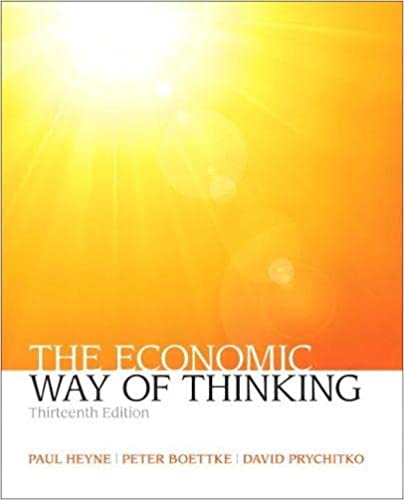
The Economic Way of Thinking 13th Edition by David Prychitko, Peter Boettke, Paul Heyne
Edition 13ISBN: 9780132992695
The Economic Way of Thinking 13th Edition by David Prychitko, Peter Boettke, Paul Heyne
Edition 13ISBN: 9780132992695 Exercise 2
What do you predict would happen if planners in Dallas decided to reserve one lane on each of its freeways for " urgent vehicles," with an urgent vehicle defined as any vehicle whose driver might be late for an important event if the vehicle were to be delayed by congestion in the regular lanes? Do you think drivers would stay out of the urgent vehicle lane? Or would it become just as congested as all the other lanes? Would such an idea be more likely to succeed in practice if drivers were generally less selfish and more considerate?
Explanation
If planners in D decided to reserve a free lane in each of its freeways for the "urgent vehicles," as such the vehicles should move into the reserved lane. Even though it's not possible predict the actions of a single driver, still it can be said that while driving they will be aware of the net advantage of each lane and will continue to move into the reserved lane. Since, other lanes will be congested and slow, the drivers will continue to move to the lane created for the urgent vehicles as the reserved lane has lesser number of automobiles and is fast moving. This will happen until the speed in all the lanes is the same. This will happen until no driver notices any net advantage to be obtained by changing the lane.
However, one cannot ignore the laws of the game, that is, the rules which each of the players in the scenario follow. These rules are known to everyone and they know the available opportunities and resources when they have to operate under a set of rules. It is possible that the drivers won't move into the reserved lane because they are aware of the law. But, it will be very difficult to distinguish between more urgent and less urgent vehicles because everyone on the street wants to reach their destination at the earliest. Therefore, the theory of net advantage is most likely to come into play.
When the drivers move to the reserved lane, they do it not because they are selfish, but they are simply not aware that whose need is more urgent (unless of course the authorities make it clear that the lane be used by vehicles like ambulance). They try to follow their own interest single-mindedly and that is reaching their destination as quickly as possible. All they know about the other vehicles is their speed, direction and velocity of the vehicles and assume that other drivers also don't want to make an accident. This means that even though the drivers are less selfish and more considerate this idea will not succeed.
However, one cannot ignore the laws of the game, that is, the rules which each of the players in the scenario follow. These rules are known to everyone and they know the available opportunities and resources when they have to operate under a set of rules. It is possible that the drivers won't move into the reserved lane because they are aware of the law. But, it will be very difficult to distinguish between more urgent and less urgent vehicles because everyone on the street wants to reach their destination at the earliest. Therefore, the theory of net advantage is most likely to come into play.
When the drivers move to the reserved lane, they do it not because they are selfish, but they are simply not aware that whose need is more urgent (unless of course the authorities make it clear that the lane be used by vehicles like ambulance). They try to follow their own interest single-mindedly and that is reaching their destination as quickly as possible. All they know about the other vehicles is their speed, direction and velocity of the vehicles and assume that other drivers also don't want to make an accident. This means that even though the drivers are less selfish and more considerate this idea will not succeed.
The Economic Way of Thinking 13th Edition by David Prychitko, Peter Boettke, Paul Heyne
Why don’t you like this exercise?
Other Minimum 8 character and maximum 255 character
Character 255


